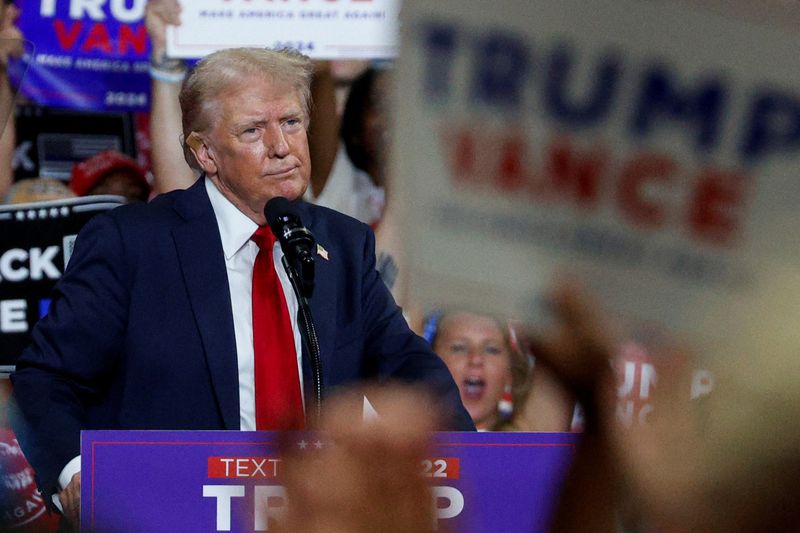Investing.com -- As per analysts at Alpine Macro in a note dated Wednesday, a victory by Donald Trump in the 2024 U.S. presidential election could lead to a reduction in global geopolitical risks, offering the potential for peace breakthroughs in key conflict zones.
This perspective suggests that a Trump presidency could "de-risk" various international situations, most notably the Ukraine conflict, which has been a major source of global instability.
Alpine Macro proposes a counterintuitive yet plausible scenario: if Donald Trump were to return to office, he could reset U.S. foreign policy in ways that encourage diplomatic resolutions to ongoing conflicts.
Specifically, the analysts believe that Trump’s approach to foreign policy might shift U.S. efforts away from continued military or financial support for Ukraine.
Instead, a Trump administration could pressure Ukraine to engage in diplomatic negotiations with Russia, which may lead to a de-escalation of hostilities.
This, in turn, could lay the foundation for a ceasefire and potentially a broader peace process.
The analysts even speculate that Trump could emerge as a candidate for the Nobel Peace Prize in December 2025, should his policies result in stabilizing the Ukraine conflict.
This unexpected prediction underscores how a Trump presidency might reshape global diplomacy, particularly by recalibrating U.S. relationships with key actors such as Russia, China, and nations in the Middle East.
One of the most major geopolitical shifts could occur in the context of the Ukraine war. Under a Trump presidency, U.S. policy might pivot away from the current approach of supporting Ukraine militarily, towards a more hands-off or neutral stance.
This change in strategy could push Ukraine and Russia toward the negotiating table, as Ukraine may no longer be able to count on sustained American military and financial assistance.
The likelihood of a ceasefire, and possibly a lasting peace agreement, would increase under these circumstances, given that both Ukraine and Russia would face pressure to reach a settlement.
From a broader perspective, Alpine Macro indicates that the global risk premium could decline sharply if the U.S. under Trump plays a more restrained role in global conflicts.
This peace dividend would not only impact Ukraine but could also extend to other geopolitical hotspots.
The de-risking effect of a Trump presidency could also extend to the Middle East. The analysts note that a less interventionist U.S. under Trump could reduce the incentives for anti-Western forces, particularly those supported by Iran, to engage in hostile actions.
If the U.S. steps back from its current posture in the region, the Middle East may experience reduced volatility, further contributing to a decrease in geopolitical tensions.
In East Asia, U.S.-China relations are another critical flashpoint. Hentov’s analysis suggests that China would likely approach a second Trump administration with caution, potentially stepping back from aggressive posturing to create room for negotiation.
The election of Trump could, at least initially, stabilize U.S.-China relations, as both countries might pursue more pragmatic interactions to avoid unnecessary conflict.
However, Alpine Macro is clear that this de-risking effect would likely be concentrated in the first year of a Trump administration, leaving open the question of whether such a peace trajectory could be sustained beyond 2025.
In contrast, Alpine Macro believes that a Kamala Harris presidency would likely exacerbate geopolitical tensions. Harris’s inexperience in foreign policy and the perception of a narrow electoral mandate would encourage U.S. adversaries to test her administration.
This scenario could lead to increased risk in areas like East Asia, particularly as China may see an opportunity to push boundaries in response to a less seasoned U.S. president.
Additionally, tensions with Russia, Iran, and other global actors might escalate, further increasing the geopolitical risk premium under a Harris administration.
The analysts argue that, under Harris, the likelihood of conflict could grow, especially in key regions like East Asia, where U.S. allies and adversaries alike would be watching closely to see how her administration responds to emerging crises.
The potential for geopolitical stability under a Trump presidency would also have important implications for global markets. Alpine Macro analysts suggest that a reduction in geopolitical risk would likely lead to lower risk premiums across a variety of asset classes.
This could foster a more favorable environment for global equities, bonds, and commodities, particularly as the uncertainties surrounding key conflict zones begin to subside.
The de-escalation of tensions in Ukraine, for example, could alleviate pressures on energy markets, leading to greater stability in oil prices.
Furthermore, reduced volatility in East Asia might benefit markets heavily exposed to U.S.-China trade relations, offering relief to sectors affected by ongoing trade disputes.
